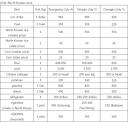Accroding to the Daily NK:
The 8th issue of Rimjingang, the periodical written by North Korean underground journalists, sheds light on North Korea’s private livestock industry.
One article, “Livestock Industry Developing from Private Means of Living into Private Enterprise,” describes how pig farming has developed during and since the famine period. It explains how, under the functioning planned economy, the “livestock industry” amounted to each household unit raising pigs to sell on the side, but now the planned economy is little more than a distant memory and the livestock sector has been specialized and systematized into sectors; breeding, butchery, distribution and sale.
That is why in North Korean markets 90% of goods are Chinese, but 100% of pigs and pork is North Korean.
Under the planned economy, roughly 20% of people in rural areas privately raised pigs and sold them to state meat procurement stores for two kilograms of corn per kilo of meat, the report notes. But from the mid 1980s, procurement stores bought them for cash, so competition grew and eventually the stores had to close due to increasing prices and their own lack of ready cash. Since the 1990s, distribution has stopped and more than 50% of people have started raising pigs in more specialized ways, it adds.
The report goes on to explain that during the March of Tribulation people figured out that their salaries, even when received, represented a mere tiny fraction of the labor value they could realize by trading illegally in the jangmadang. Many were unwilling to put up with it.
“Going through the March of Tribulation, the profit motive through the market has opened the door to new food lives which the Leader cannot open with his slogan, ‘reform food lives with meat,’” the report asserts. “Now, since a powerful supply and demand system has been spontaneously established, anybody can afford to eat meat as long as they can earn money.”
“’Leave us alone!’ is the real voice of the people of Chosun,” the report concludes, adding that the phenomenon of the Chosun pig farming industry implies the clear potential to develop modern industry in North Korea.
The 8th edition of Rimjingang was published in Korean on June 30th.
Read the full story here:
The All-North Korean Pig Farming Sector
Daily NK
Yoo Gwan Hee
7/10/2010

